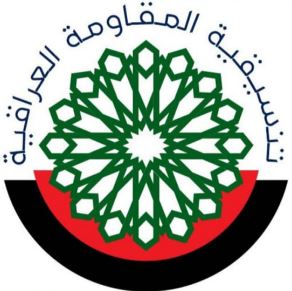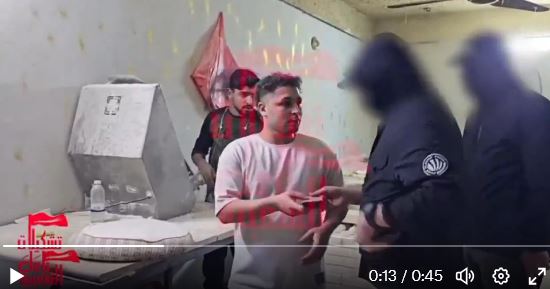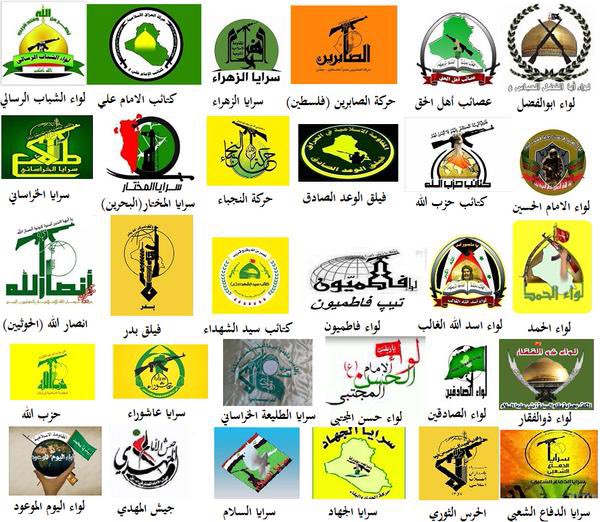In response to recent airstrikes on Yemen’s Iran-backed Houthi rebels, two new armed factions have emerged in Iraq, pledging to defend Iraq and Yemen through jihad.
The first group known as the Al-Abbas Martyrdom-seeking Shield Forces (Quwwat Dir’ al-Abbas al-Istishhadiyah), introduced itself in a video featuring a masked speaker and two armed men. The speaker, who was identified as Karrar Fattah al-Subaihawi, the group’s Secretary-General, outlined the group’s goals as “protecting Iraq and the faith” and urged Iraqis, particularly those in the paramilitary Shia-dominant Popular Mobilisation Forces (PMF) to join the “jihadist project”.
However, the speaker’s poor language and grammatical mistakes, as well as his mixed Iraqi-Syrian dialect, have raised doubts about the authenticity of the group. An investigation by Al-Sumaria News found that al-Subaihawi has been involved with other militant groups in the past and has expressed a desire to “liberate the Sayyida Zainab shrine from the new Syrian administration”.
Another faction, known as the Call of Jerusalem Brigades, released a statement on March 16, addressing Houthi leader Abdulmalek al-Houthi and announcing it’s readiness to target US interests at his command. The statement condemned the US for its “heinous crimes” against the Yemeni people and pledged to make the US “pay for their crimes”.
While domestic media outlets have reported on the emergence of these new factions, major pro-Iran Telegram channels have not mentioned them, casting doubt on their authenticity and potential connections to established Iran-backed groups.
In response to the emergence of these new factions, a member of the Iraqi Resistance Coordination Commission (IRCC), an umbrella group of Iran-backed militias, stated that the group would meet to discuss their stance on the issue. The IRCC has received warnings from the government and political figures that any involvement in Yemen’s war could provoke US retaliation, including direct strikes on Iraqi militias.

Iraqi lawmaker Iskandar Watut has also warned that Iraqi factions intervening in Yemen could risk US airstrikes and economic sanctions. He urged the Iraqi government and political allies of Iran-backed factions to pressure militias and their leaders to avoid escalation, stating that such actions would not be in Iraq’s best interests and could harm the country’s security, economy and political standing.
The formation of these groups has raised questions about the purpose of these new formations, whether external parties are behind their creation, and how Iraqi authorities will deal with them. The emergence of these groups comes at a time when the Iraqi government is under pressure from the United States to dissolve all factions present in the country, particularly those linked to Iran within what is know as the “Axis of Resistance”.
There have been at least four new groups announced this year. These groups are the latest to emerge in Iraq following the establishment of the “Ya Ali Popular Formations” in early March, which has pledged to launch systematic targeting campaigns against Syrian refugees and workers in Iraq in retaliation for the Alawite sectarian victims of the events on the Syrian coast.
The “Ya Ali Popular Front” accused the Iraqi government of favoring what it described as ‘terrorists’, asserting that it had taken it upon itself to expel Syrians from Iraq under the pretext that they were “sleeper cells” of terrorism.
A video clip showed the members of the “Ya Ali Popular Front” raiding Syrian workplaces. Their personal phones were searched, and they were assaulted and humiliated when any context related to the new Syrian administration or the country’s unelected president, Ahmed al-Sharaa’, was found.

Prior to this on 14 February 2025, the formation of the “Burhan Force” was also announced, claiming to be responsible for defending the land and the people against the occupation (which it did not name) inside and outside Iraq.
According to its statement, “The occupation has persisted in its crimes, shed the blood of innocents, and attacked our land and holy sites, disregarding International laws and humanitarian conventions. In the face of this ongoing aggression, we affirm that the right to self-defense is legitimate, and that the people will not stand idly by in the face of these crimes.”
Commenting on this increase in the new Jihadist organizations, Issam al-Fayli, a professor of political science at al-Mustansiriya University explained to Arabi 21 that “those who formed these factions were sending a message to foreign countries more than to Iraq itself, because there is a regional cartel (contract) ideologically linked to the concept of the Guardianship of the Jurist”. Al-Fayli expressed his belief that “the formation of such factions at this time is a temporary matter linked to the nature of the pressures Iran is facing from external powers”.
From a practical viewpoint, Al-Fayli suggests that the “Iraqi constitution prohibits the formation of any armed groups outside the state, and therefore the government is obligated to question and monitor these groups, because their issue poses a threat to Iraq’s international reputation.”

Al-Fayli also commented that “the formation of new militias is gateway to corruption in Iraq, at a time when the government is ignoring all messages it receives from the United States and international actors seeking to end militias in the Middle East.”.
The formation of such groups has similarities to the aftermath following the assassination of the deputy head of the Popular Mobilization Forces, Abu Mahdi al-Muhandis, and the commander of the Iranian Quds Forces, Qassem Soleimani. Several armed factions emerged following these assassinations, carrying out operations against US forces in Iraq. These factions included: Ashab al-Kahf, al-Thaereen, Sarayat Thawr al-Thaniya, Thaer al-Muhandis Group, Quwat Dhu al-Fiqar, Awliya al-Dam, Sarayat al-Muntaqim, Qasim al-Jabareen, and al-Ghashiya; all of which are believed to be fronts for other well-known militias in Iraq. It is plausible that history is repeating itself with well known militia groups hiding behind new front organizations.

